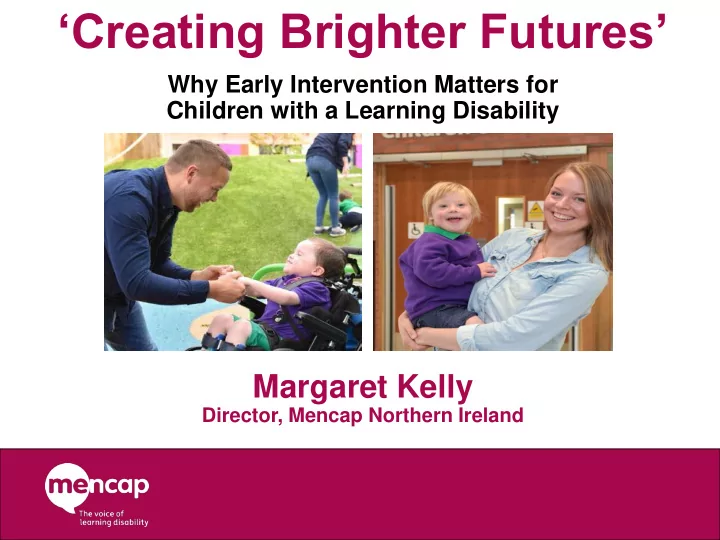

‘Creating Brighter Futures’ Why Early Intervention Matters for Children with a Learning Disability Margaret Kelly Director, Mencap Northern Ireland
Priority for Mencap • Children with a learning disability have the best start in life • More children with a learning disability aged 0-7 have better health & development, improved cognitive skills, and stronger social & inter-personal skills
Why? Early intervention is effective • Child development • Social and economic benefits • Improves resilience • Strengthens parenting skills • Supports children’s learning
Why? Risk factors for children with a learning disability • Behaviours that challenge • Adverse childhood experiences • Poor outcomes
Children with a learning disability are more likely to: • Have greater difficulty with sleep and feeding • Grow up in poverty • Have poor educational attainment • Not be in education, employment or training • Grow up in care In Northern Ireland: - 2.5% of children have a LD - 10% of looked after children have a LD
Children with a learning disability are more likely to experience: • Being bullied in school • Social isolation & loneliness • Mental ill-health - 1 in 7 children in UK with mental health problem has a LD • Poor physical health - 30% - 70% increased risk of obesity at 5, 7, 11 years - Average shorter life expectancy of 16 years
Families of children with a learning disability are at greater risk of: • Poverty • Social exclusion • Physical ill-health • Mental health difficulties • Parental divorce & separation
Barriers to service provision
Supporting the child • Early development support in partnership with BHSCT - Allied health professionals - High staff to child ratioŸ - Individual learning plans Ÿ - Three play-zone areas - Ÿ HighScope approach / measurement • Early education & reading skills
Supporting the family • Early Positive Approaches to Support (E-PAtS) • Functional Communication Training (FCT) • Skills-based workshops • Practical support • Advice and information
Influencing systems change • Collaborative research projects • Programme evaluation • Mapping local systems and services • Campaigning for improvements in policy and practice
Recommendations • Early intervention services for children with a learning disability that support development from birth • Access to family support services in every HSC Trust • A specific focus on children with a learning disability in the PfG and the CYPs Strategy • Inclusion of children with a learning disability in key policy areas – ACEs / IMH / family support / poverty • A review of service provision • Appropriate support and training for early years staff
Thank you For more information, contact: Margaret Kelly Email: margaret.kelly@mencap.org.uk Telephone: 028 9069 1351
Recommend
More recommend